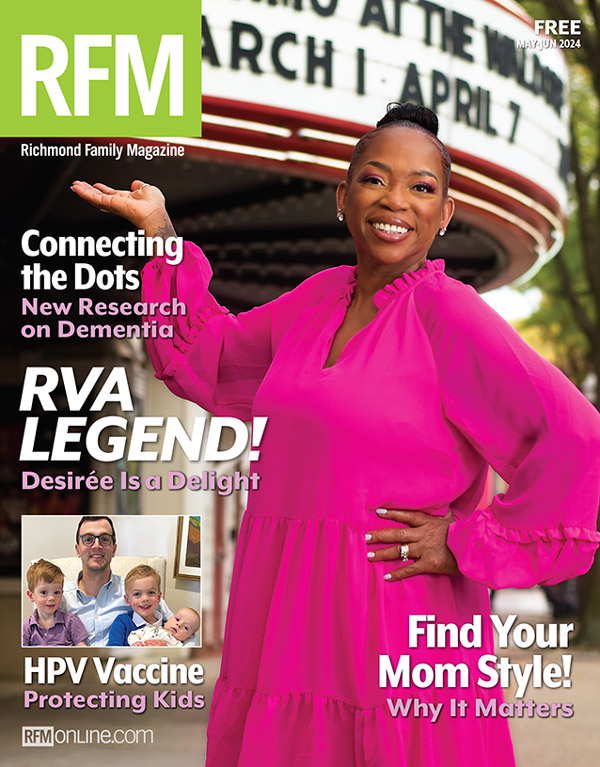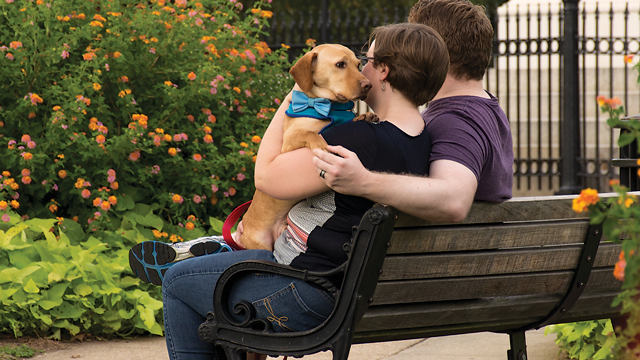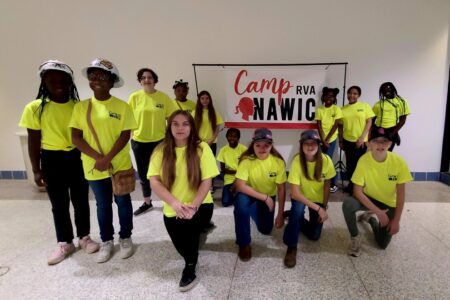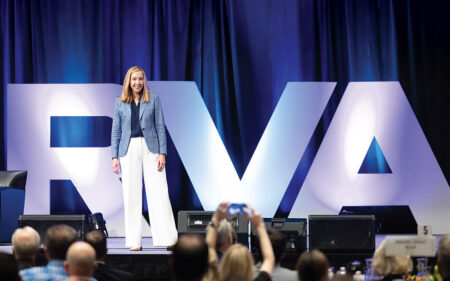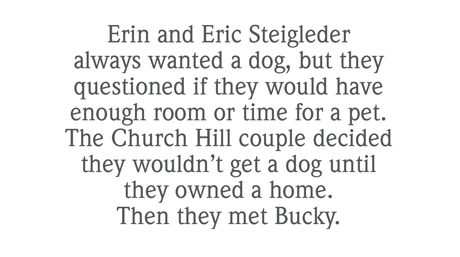 Bucky found us,” Eric says.
Bucky found us,” Eric says.
The couple had gone to a Super Bowl party last year, and a friend who was fostering Bucky through a Fetch a Cure program called Pixie’s Pen Pals brought him with her to share in the football fun.
That was Sunday. By Tuesday, the couple had signed the papers and paid the fee to adopt Bucky. “We had him in the house that evening,” Eric says.
A lab and dachshund mix, Bucky has the yellow coat of a lab, but is short to the ground with stubby legs and a long body. “He’s a weird boy,” Eric says with a laugh.
One of the things that attracted the couple to Bucky was the easy way he interacted with Holden, a friend’s little boy just shy of his first birthday. Bucky, who is intuitive with children, would gently snuggle on the couch with the youngster and make him laugh.
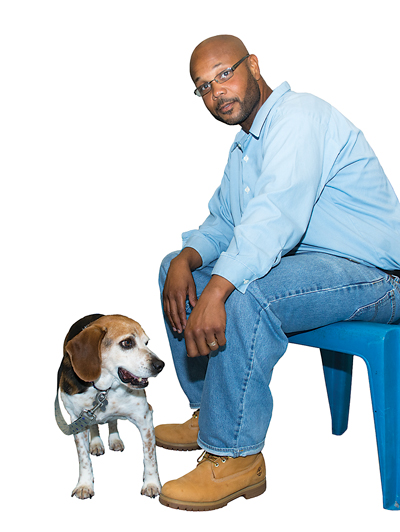
That type of affectionate interaction was important to Eric and Erin because the couple plans on having a family. “He was immediately friendly and gregarious. He was into making everyone happy,” Eric says. “He was excited, but he would curl up beside you. He was the perfect mix, and we fell in love with him.”
Bucky was rescued from a shelter by Pixie’s Pen Pals and trained through the organization’s prison program. “He’s very easy to work with,” Eric says of Bucky, who is leash-trained. “He’s a fun dog, but he’s a dog that has received good training and it has stuck with him.”
He recounts a day when Erin was walking down the street with Bucky, and she dropped his leash suddenly. “Bucky noticed there wasn’t any tension in the leash, and turned around to see what was wrong,” Eric says. “Tricks are fun, but as a dog owner in the city (Richmond), we think the skills that Bucky has been taught are more useful than tricks. They are life skills. They help the dogs navigate the world and help you navigate the world with them.”
Pixie’s Pen Pals prison program was initiated in 2001 by Save Our Shelters, and picked up by Fetch a Cure in 2010 when Save Our Shelters closed. Fetch a Cure works to raise awareness and further education about pet cancer, detection, and treatment, as well as senior care and aging issues for dogs. Through its Companions in Crisis program, Fetch a Cure provides financial aid to families who can’t afford life-saving treatments for pets that have been diagnosed with cancer.
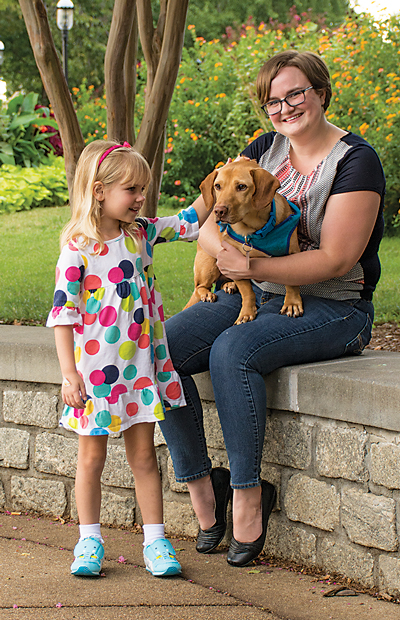
“We are all about education, and this was a good fit. This is a huge educational program for offenders,” says Sarah Hornberger, former Pen Pals coordinator. (Emily Clanton is now the Pen Pals coordinator and Christine Eacho is the Pen Pals manager.)
The program rescues less-desirable dogs (no disrespect for Bucky) from local shelters for adoption, and places them in prisons where offenders who are trained as canine handlers work with the dogs to help them become more adoptable.
“The program not only gives offenders the opportunity to work with dogs and help the dogs increase their chances of thriving in the real world, but it also increases the offenders’ chances of being successful,” Hornberger says.
The rescue dogs are taken primarily from the Southside SPCA. But the Pen Pals program also pulls from Richmond Animal Care and Control and Richmond Animal League. “We pull from rural kill shelters,” Hornberger says. “We have spaces in the prisons right now for thirteen dogs in three facilities – Lunenburg Correctional Center, Fluvanna Correctional Center for Women, and Buckingham Correctional Center.”
Lunenburg Correctional Center, where Bucky was trained, partnered with the program in 2005. Inmates interested in working with the Pen Pals program are screened before they can be considered to be handlers. “They have to meet certain criteria and be on excellent behavior,” says Kathleen Gayeski, counselor at Lunenburg Correctional Center, who was facilitator of the Pen Pals program at the prison for ten years.
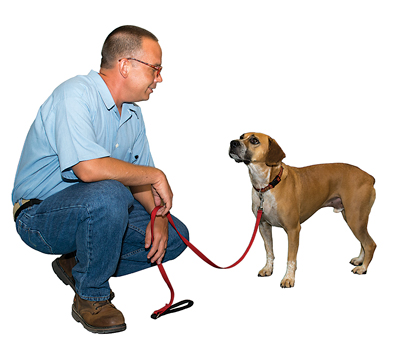
The offenders are on a probationary period for the first ninety days. During this time, they have to meet certain benchmarks and competency requirements before they can become a primary handler. “We have a trainer who comes in from outside once a week as
part of the program and shows offenders different training techniques,” says Gayeski. “Not every dog is the same. It does take a village to make the program work.”
Two offenders are selected as a tag team to train one dog. Dogs in the program stay in a crate in the cell with their two canine handlers and receive hands-on training and companionship twenty-four hours a day. “We want to get the dogs acclimated to being with families and around people,” Gayeski says.
Hundreds of dogs have been trained through the program. On average, fifty dogs are rehabilitated each year. “All of the training is done with positive reinforcement,” says dog trainer Katie Locks of Lucky Dogs Training, who helps train the inmates who will be handlers in the Pen Pals program. “We don’t allow anything negative. Every dog finds a place. If it doesn’t work out in the program, the dog will go into foster care.”
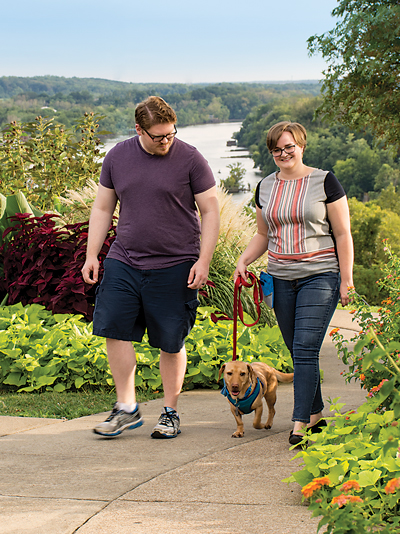
Currently there are twelve handlers and six dogs in the program at Lunenburg. Dog trainer Kasey Herrera of 2SpeakDog works with handlers at Fluvanna Correctional Center and oversees training. The handlers teach the dogs basic commands such as sit and stay. “From a behavior aspect, they teach the dog to make the right choices,” Herrera says. “The handlers learn how their energy affects the dog’s energy. They learn to be balanced with their dogs so the dogs can be balanced. Dogs mirror us. If we are nervous, the dogs are nervous.”
Herrera got involved with the program so she could play a part in saving the lives of dogs in kill shelters that don’t have any other options. “Being part of this program, I see how many
humans it touches as well,” she says. “The offenders are learning a skill that they can bring forward later. It’s also teaching them communication skills. To see them grow in those roles is pretty cool. It’s like watching the students in my regular classes. It puts a smile on your face.”
Selecting dogs to pull for the program can be difficult. “You want to pull them all,” Herrera says. “We are looking for a certain temperament, a dog that has been in the shelter and is a great dog, but for whatever reason hasn’t been adopted. We give these dogs the chance they need.”
Locks, who began working with the program in 2009, believes Pen Pals is “truly one of the better rehab programs. It’s doing a great job of turning the offenders’ attitudes around,” she says. “For them, it’s being responsible for another being. They take great pride in the program. It has also helped me learn patience with other people and to be understanding and forgiving.”
Offender Jon Ganz has been working as a canine handler for four years at Lunenburg. “In prisons, you don’t have the opportunity to do good,” he says. “I had reached a point where I could have some form of positive impact. I had eliminated all of my vices. I love dogs and I wanted to do some good.”
Ganz has trained about fifteen dogs since he was accepted into the program. Some of the dogs he works with had never been socialized or had been abused. “They might be huddled in the corner out of fear,” he says. “We give them the understanding that they can trust people. They go from shivering in the corner to running around.”
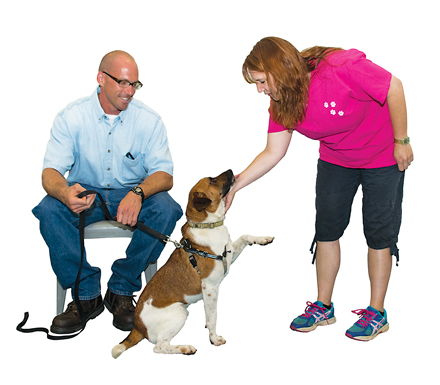
Dogs going into the program at a prison are often overwhelmed at first. “Prison is overwhelming for people, so you can imagine the impact on a dog,” Ganz says. “I live in a building with forty-eight other guys.”
The first day of training is devoted to letting the dog decompress. “We put zero pressure on the dog in the beginning,” Ganz says, noting that from there on out, it’s about getting the dog to trust you. “They are already powerless because they have learned helplessness. We try to teach them empowerment, to build their confidence and worth through self-efficacy.”
Training typically takes anywhere from five to seven weeks. Ganz says the program is beneficial for offenders like him as well as for the dogs. “I have learned responsibility and the ability to empathize,” he says. “I’ve also learned patience.”
The dogs bring a sense of warmth and happiness not only to their canine handlers, but also to the other offenders in the prison. “Everybody around the dogs benefits,” Ganz says.
Other canine handlers in the program at Lunenburg agree on the merits of the program. “This program had an element of responsibility you can’t get in most other prison environments,” says offender Shane Cubbage. “It’s a relief to have some responsibility. It also gives you a sense of accomplishment and teaches you social skills.”
Offenders Bruce Diggs and Kevin Greene who recently worked with Ernie, a beagle with some trust issues, found that once Ernie warmed up to them, he was easier to train. “It’s rewarding,” Diggs says of being in the program. “You see your dog go from nothing to being fully trained.”
“The program is therapeutic,” chimes in Greene. “You know you are giving the dog a second chance.”
Offender Shaddai Omolara sees a lot of similarities between the dogs and the offenders. “Some of the dogs have similar issues to us, like not having good examples of how to conduct ourselves properly in society,” he says.
The canine handlers try not to get too attached to the dogs “because you know they are leaving at some time,” says Michael Blake. “I wanted to work with them because I know when they go to a good home, they will be ready.”
Offenders Isac Kingsby and Wayne Simmons both love working with animals. “It’s a good way to help the dogs and do something to better myself,” says Simmons.
Kingsby agrees. “This is something positive I can learn to take back with me.”
Bucky’s new parents, Eric and Erin, liked the idea of adopting a rescue animal “but this is the next step,” says Eric. “This is a rescue animal that has helped rescue a person. The person is learning skills, and the animal is learning skills. It has helped contribute to the rehabilitation of someone.”
He believes that one of the reasons Bucky is so loving with people is that he was loved when he was being trained at Lunenburg. “I imagine if he were to go and see his trainers he would be as excited to see them as he is to see us,” Eric says. “What we have seen every day is that he has had a pretty remarkable experience
in this program.”
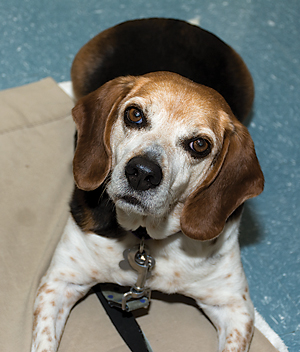 Pixie’s Pen Pals
Pixie’s Pen Pals
Pixie’s Pen Pals has up to twenty dogs in its program at a time, including dogs in foster care. The organization doesn’t have a physical shelter, so foster care is a large element of the program. Volunteers who foster the dogs often take them along to events in the hope they will be adopted.
Rachel Friedman of Richmond started volunteering in foster care after her cat passed away from cancer. She enjoys introducing the dogs to people at events. “It helps not just the dogs but people as well,” she says of fostering a dog. “I benefitted from getting companionship for the weekend.”
Pen Pals’ adoption fee ranges from $175 to $275. The fee covers a spay/neuter procedure, vaccinations, heartworm tests, de-worming, flea/tick and heartworm preventative, and urgent or specialty veterinary visits while the dog is in the organization’s care. The adoption fee also includes a bag of Sammy Snacks dog food, a collar, leash, and a Pen Pals ID tag.

